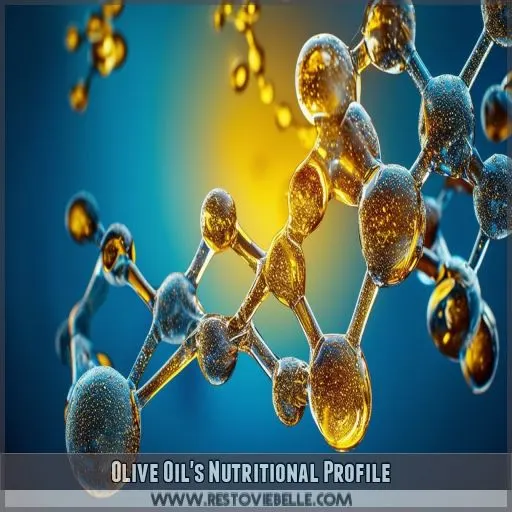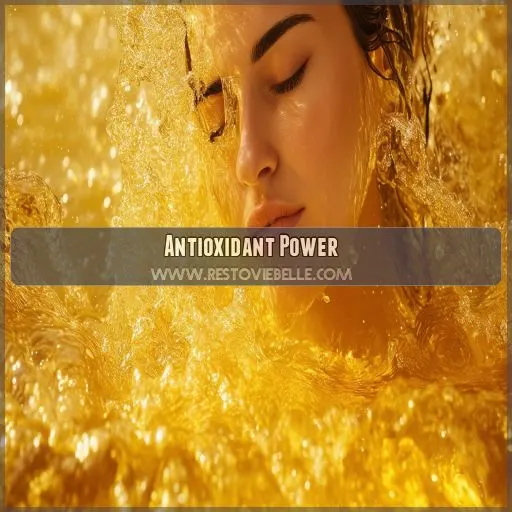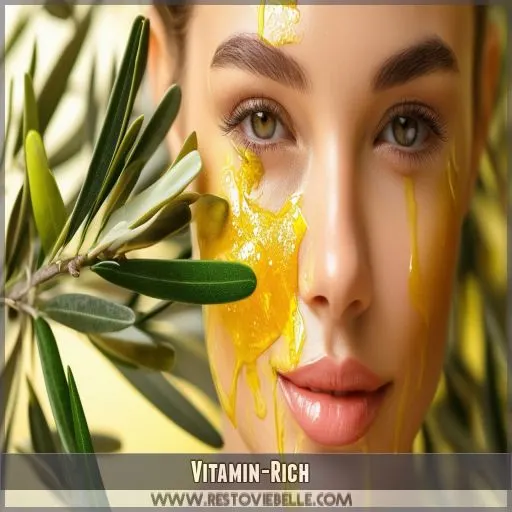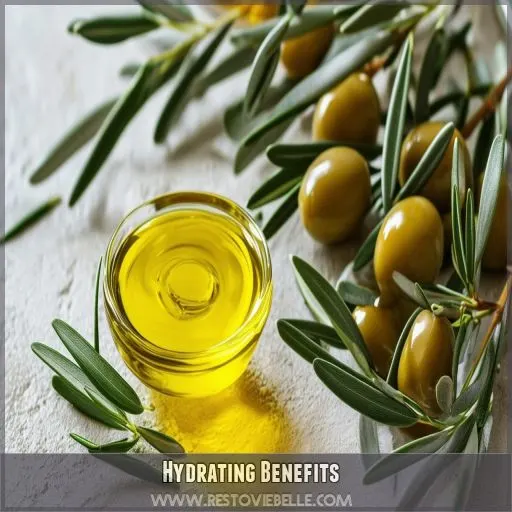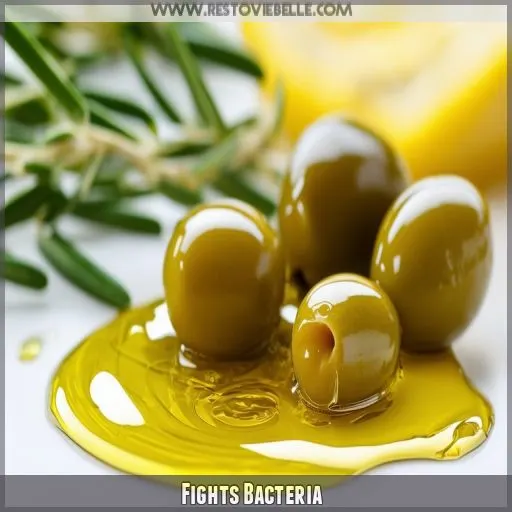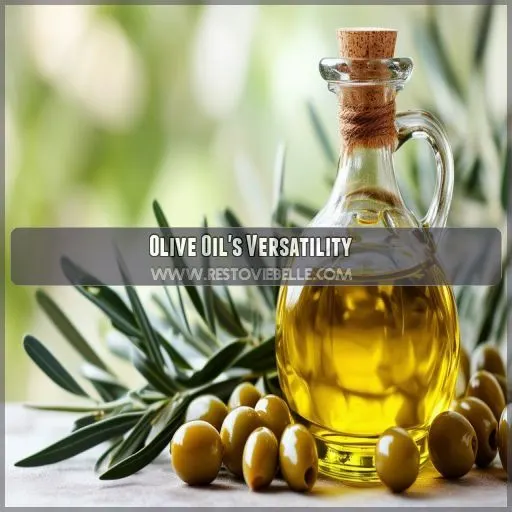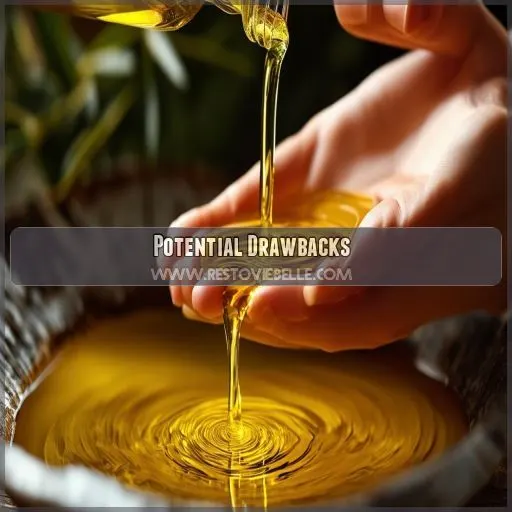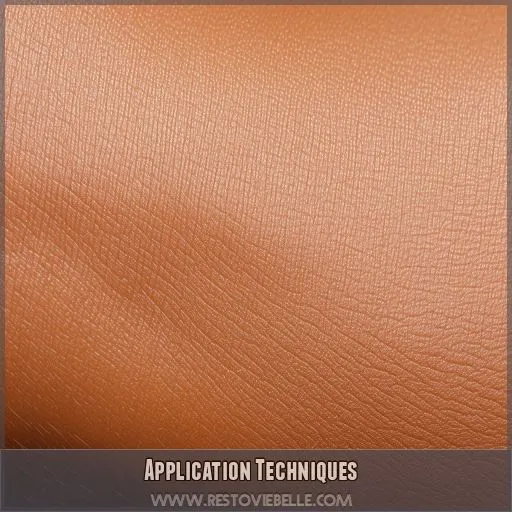This site is supported by our readers. We may earn a commission, at no cost to you, if you purchase through links.
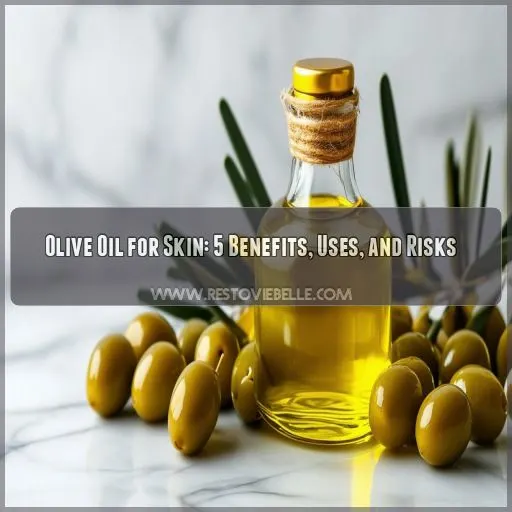
But what are these benefits, and how can you harness the power of olive oil for your skin? Let’s delve into its secrets, exploring the evidence behind its moisturizing, antioxidant, and anti-aging properties.
However, it’s essential to approach this exploration with a discerning eye, considering both olive oil’s potential benefits and risks to make informed decisions about incorporating it into your skincare regimen.
Table Of Contents
- Key Takeaways
- Olive Oil’s Nutritional Profile
- Antioxidant Power
- Vitamin-Rich
- Hydrating Benefits
- Fights Bacteria
- Olive Oil’s Versatility
- Potential Drawbacks
- Application Techniques
- Frequently Asked Questions (FAQs)
- Is it good to put olive oil on your skin?
- Can I leave olive oil on my face overnight?
- Which is better, coconut oil or olive oil for skin?
- Can olive oil remove dark spots?
- Can I use olive oil straight from the kitchen pantry?
- What if I have sensitive skin?
- How do I test for skin reactions?
- Can I use olive oil as a makeup remover?
- Can I use olive oil for shaving?
- Conclusion
Key Takeaways
- Olive oil is a skincare superhero: It’s got antioxidants, vitamins, and fatty acids that moisturize, fight wrinkles, and even heal wounds. It’s like a magic potion for your skin!
- But don’t go overboard: Olive oil is great, but too much can clog your pores and cause breakouts. Think of it like a delicious dessert—a little goes a long way.
- Test it out first: Before you slather olive oil all over your face, do a patch test. That way, you can make sure it doesn’t turn your skin into a red, itchy mess.
- Use the good stuff: Not all olive oils are created equal. Go for extra virgin olive oil, which has the most nutrients and benefits. It’s the cream of the crop, the crème de la crème of olive oils.
Olive Oil’s Nutritional Profile
Olive oil is packed with nutritional benefits, and its composition can vary depending on the olive cultivar and environmental factors. The dominant fatty acid in olive oil is oleic acid, a monounsaturated fat that makes up 55% to 83% of its total fat content. This gives olive oil its resistance to oxidation and contributes to its heart-healthy properties.
In addition to oleic acid, olive oil also contains other fatty acids like linoleic acid (3% to 21%), linolenic acid (1%), palmitic acid, and stearic acid. The specific amounts of these fatty acids can vary depending on the olive cultivar. For example, the Koroneiki cultivar tends to have higher levels of oleic acid and lower levels of linoleic acid compared to other cultivars.
The nutritional profile of olive oil also includes vitamins E and K, which offer additional health benefits. Vitamin E is an essential nutrient and a powerful antioxidant, while vitamin K plays a crucial role in maintaining bone health and normal blood clotting.
When applied to the skin, olive oil’s nutritional composition makes it an effective moisturizer and contributes to its ability to protect against UV damage and promote wound healing. However, it’s important to note that olive oil may not be suitable for those with sensitive skin, as it can potentially worsen conditions like dermatitis.
Antioxidant Power
Olive oil is packed with antioxidants, which are chemicals that prevent oxidation and damage from free radicals. Olive oil is rich in polyphenols, which are a type of plant-based antioxidant with anti-inflammatory and anti-cancer properties. These polyphenols include oleuropein, verbascoside, oleocanthal, hydroxytyrosol, and tyrosol.
The antioxidant power of olive oil has been linked to reduced risk of skin cancer. A study on mice found that applying olive oil to the skin after sun exposure led to significantly lower rates of tumor growth compared to control groups.
Olive oil’s polyphenols have also been shown to reduce inflammation and protect against inflammatory diseases, such as rheumatoid arthritis, Alzheimer’s disease, and cancer. They may also reduce the risk of type 2 diabetes and improve blood sugar levels in those already diagnosed.
Vitamin-Rich
Olive oil is rich in vitamins A, D, E, and K, which have various benefits for the skin. Vitamin E, for example, has been used to treat skin conditions like psoriasis and eczema. The vitamins in olive oil also enhance cell turnover, resulting in brighter and smoother skin.
Olive oil’s vitamin content, along with its antioxidant properties, can help prevent premature aging and wrinkles. Its emollient qualities provide sun protection and aid in scar treatment and wrinkle prevention. However, due to its heavy texture, it shouldn’t be used as a daily face mask as it may clog pores and cause breakouts, especially for those with oily skin.
Hydrating Benefits
Olive oil’s richness in fatty acids and antioxidants deeply hydrates your skin, preventing water loss and keeping it supple. Additionally, its anti-inflammatory properties soothe and calm irritated skin, promoting a healthy and youthful appearance.
Deep Hydration
Olive oil is a fantastic emollient, which means it can deeply hydrate your skin. It does this by locking in moisture and preventing water loss. This is especially beneficial for those with dry or compromised skin, helping to heal and protect it.
Here are some key benefits of olive oil for deep hydration:
- Locks in moisture, preventing water loss.
- Rich in vitamins A, D, K, and E, which improve skin health and appearance.
- Contains squalene, supporting the skin’s moisture retention.
- Has anti-inflammatory properties, aiding in wound healing.
Anti-Ageing
Olive oil has been used as a beauty treatment for centuries, with Cleopatra and ancient physicians noting its use. However, it may not be suitable for everyone.
On the one hand, olive oil is a natural anti-inflammatory that can help with wound healing and is high in hydrating squalene and protective antioxidants. It can be used as an occlusive agent, trapping water and moisture into the skin and preventing it from escaping.
On the other hand, olive oil is a naturally heavy oil, which can make it a breeding ground for bacteria that clogs pores and causes acne. It also has a high level of oleic acid, which can be detrimental to the skin barrier and cause water loss.
Therefore, while olive oil can be good for anti-aging and wrinkle prevention, it may not be suitable for those prone to acne.
Soothing Properties
Olive oil has soothing properties that can benefit dry or irritated skin. Its anti-inflammatory properties help to calm redness and irritation caused by acne or psoriasis.
Here are five ways olive oil can be used to promote skin conditioning and hydration:
- Moisturizer: Olive oil can be applied directly to the skin as a natural moisturizer, providing deep hydration by locking in moisture.
- Makeup Remover: Olive oil can effectively dissolve and lift off stubborn eye makeup, including waterproof mascara and eyeliner, without irritating the delicate skin in the eye area.
- Exfoliator: When mixed with sea salt or sugar, olive oil becomes an effective exfoliator, helping to remove dead skin cells and leaving the skin feeling smooth.
- After-Sun Treatment: Olive oil can be beneficial for sun-exposed skin, providing extra hydration and relief from sun damage.
- Wound Healing: The anti-inflammatory and antimicrobial properties of olive oil aid in wound healing and may help prevent and treat pressure ulcers and diabetic foot ulcers.
Fights Bacteria
As we’ve seen, olive oil is a fantastic hydrator. But did you know it’s also a powerful antibacterial agent? That’s right—it’s been shown to fight off harmful bacteria and treat infections.
| Bacterial Infections | Antibacterial Properties of Olive Oil |
|---|---|
| Staphylococcus aureus | Phenolic compounds |
| H. pylori | Polyphenols |
| Escherichia coli | Oleanolic and maslinic acid |
| Listeria monocytogenes | Vitamin E |
| Salmonella enteriditis | Hydroxytyrosol |
The polyphenols in olive oil, for instance, have been found to combat H. pylori infections, which can lead to stomach ulcers and cancer. Meanwhile, research suggests that vitamin E, another component of olive oil, may kill the bacteria that cause acne, eczema, and psoriasis.
Olive oil’s antibacterial properties are thanks to its rich composition of phenolic compounds, polyphenols, and oleanolic and maslinic acids. These components work to decrease the growth of harmful bacteria while promoting the growth of beneficial gut bacteria.
When it comes to treating infections, olive oil has been found to be effective against Staphylococcus aureus, a common cause of hospital-acquired infections, and H. pylori, which can lead to stomach issues.
Olive Oil’s Versatility
Olive oil is versatile, and its uses vary depending on its quality. When purchasing olive oil, look for certification by the International Olive Council (IOC), which sets physico-chemical standards for purity and quality. The North American Olive Oil Association (NAOOA) provides the largest testing and certification program in North America and Canada, so their seal is a good indicator.
Olive oil blends are common, often mixing extra virgin olive oil with more neutral oils like canola, grapeseed, or sunflower. These blends are more affordable and have a milder flavor, making them suitable for various cooking applications without overpowering other ingredients.
Storage methods and production techniques also impact olive oil quality. Proper storage ensures the oil maintains its nutritional and sensory properties.
Potential Drawbacks
While olive oil has many benefits, it’s not without a few potential drawbacks. Olive oil is comedogenic, meaning it can clog pores and lead to acne breakouts. Its high oleic acid content can cause blackheads and worsen existing acne. If you have acne-prone skin, it’s best to avoid olive oil or use a diluted form.
Additionally, some people may find olive oil too heavy and greasy for their skin type. It may also cause a rash or skin irritation, especially if you’re allergic. A 2012 study showed that topical application can lead to mild superficial reddening of the skin and a reduction in the integrity of the stratum corneum, the outer layer of skin. Olive oil can also exacerbate dermatitis and contribute to eczema in infants.
To avoid potential side effects, always perform a patch test before incorporating olive oil into your skincare routine.
Application Techniques
Olive oil can be applied directly to the skin as a moisturizer, either alone or mixed with other ingredients like honey or egg yolk. It can also be used as a base for DIY face masks or exfoliants.
When using olive oil on your face, opt for extra virgin olive oil and perform a patch test to ensure your skin tolerates it. Blot off any excess oil with a towel to prevent clogged pores.
You can also incorporate olive oil into your skincare routine by choosing products that list it as a main ingredient, such as facial cleansers, soaps, and moisturizers.
Frequently Asked Questions (FAQs)
Is it good to put olive oil on your skin?
Olive oil has many potential skin benefits, including moisturizing, anti-aging, and wound-healing properties. However, it may not suit all skin types, especially those with sensitive or acne-prone skin. Always perform a patch test before incorporating olive oil into your skincare routine.
Can I leave olive oil on my face overnight?
You can slick on olive oil and sleep soundly. But, slick too much and you’ll be sorry. So, smooth on a slim smear, and you’ll wake up with a smile.
Which is better, coconut oil or olive oil for skin?
Coconut oil and olive oil have unique benefits for skincare. Coconut oil is absorbed quickly, treats acne scars, and has antimicrobial properties. Olive oil is rich in antioxidants, moisturizes, and suits sensitive skin. The best choice depends on your skin type and specific needs.
Can olive oil remove dark spots?
Like a beacon in the night, olive oil can bring light to dark spots. Yes, olive oil can help fade dark spots and scars, thanks to its vitamins and antioxidants, which promote skin regeneration and collagen production. While it may not be as effective as other treatments, regular application can reduce their appearance over time.
Can I use olive oil straight from the kitchen pantry?
Yes, but it’s best to use olive oil within a month or two of opening it. Store it in a cool, dry, dark place, like a pantry, and avoid plastic containers, as chemicals can seep into the oil.
What if I have sensitive skin?
If you have sensitive skin, use olive oil sparingly and always do a patch test first. Rub a few drops onto your forearm and wait 24 to 48 hours to ensure no reaction occurs.
How do I test for skin reactions?
Testing for skin reactions involves methods like the skin prick test, intradermal test, and patch test. For the skin prick test, a small amount of the potential allergen is placed on the skin and then pricked to induce a reaction.
Can I use olive oil as a makeup remover?
Yes, olive oil can be used as a makeup remover. Massage a few drops onto your skin, then rinse with a warm, damp cloth. Follow with a cleanser to remove any residue. It’s a natural, gentle, and cost-effective option.
Can I use olive oil for shaving?
Yes, you can use olive oil for shaving. It’s a healthier alternative to shaving creams, which often contain artificial additives. Olive oil is rich in antioxidants and has been used for centuries as a natural moisturizer. It’s also very affordable. However, some people find that it clogs their razor.
Conclusion
Olive oil is a versatile ingredient with a multitude of benefits for your skin. From deep hydration to anti-aging and even wound healing, it’s a natural skincare superstar. But, as with any ingredient, it’s important to use olive oil with caution and be mindful of potential drawbacks, especially if you have sensitive skin.

